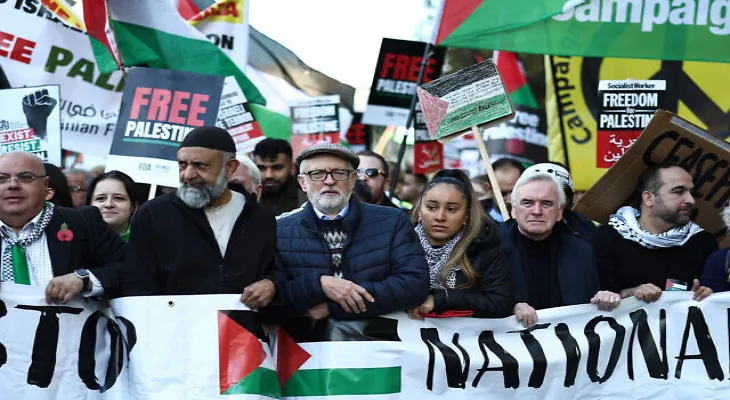Search here
Newspaper
Search here

Arab Canada News
News

Published: November 11, 2023
About 300,000 people demonstrated in the British capital today, Saturday, as pro-Palestinian activists made the latest collective call for a ceasefire, with police deployed in large numbers to prevent clashes with anti-demonstrators.
The "National March for Palestine" organized by the Stop the War coalition began after two minutes of silence to commemorate the British war dead on Armistice Day, at the war memorial in central London.
The huge crowds of demonstrators waved Palestinian flags in black, red, white, and green and held up signs reading "Stop bombing Gaza," just over a month after Hamas fighters crossed the border and destroyed Israeli communities, killing more than 1,200 people and taking about 240 hostages, while the Hamas-run Ministry of Health in Gaza confirmed more than 11,000 people have been killed since the war broke out.
As the march began, protesters chanted “Free Palestine” and “Ceasefire now.”
London Metropolitan Police arrested nearly 100 people in previous pro-Palestinian rallies, including support for Hamas, banned as a terrorist organization in the UK, and hate crimes, but Saturday’s march raised concerns as it coincided with Armistice Day, the anniversary of the end of fighting in World War I in 1918 – amid political criticism over police handling.
Prime Minister Rishi Sunak made a late call for calm late Friday, urging protesters to do so “respectfully and peacefully,” and Deputy Assistant Commissioner of the Metropolitan Police, Laurence Taylor, said the march organizers changed the route from Hyde Park to the US Embassy in South London to ensure it did not pass any historic memorials.
Taylor, who is leading the police operation, told reporters that previous events saw “small groups break away” and “their behavior escalate and become more violent.”
Metal barriers were placed around the area containing the most important memorials, and a no-go zone was established to enable police to arrest any marchers attempting to violate it.
Thousands of people wearing red poppy flowers – the symbol of remembrance – stood bowed at the Whitehall memorial in a solemn reflection ceremony, with other services held across the country.
Minor scuffles broke out near the memorial as anti-demonstrators – many dressed in black with covered faces, some waving the English St George’s flag and the Union flag – tried to break through police lines.
British media reported that Tommy Robinson, leader of the far-right English Defence League, was among the opposing protesters.
About 1,850 police officers were recruited, including some other forces across Britain, to maintain peace, with 1,375 on Sunday when a national remembrance ceremony will be held at the memorial led by King Charles III, senior royal family members, and political leaders.
Home Secretary Suella Braverman, increasingly right-wing, has done little to ease tensions, accusing the police of being more sympathetic to pro-Palestinian protests than others.
Support for the Palestinians is a long-standing policy of the British political left.
The government was also at odds with the Metropolitan Police this week after ministers called to ban the march, raising concerns about political interference in operational matters.
Sunak said he would hold Metropolitan Police Commissioner Mark Rowley “accountable” for his decision to allow the demonstration to continue. However, Rowley said it did not meet the minimum threshold for a rare government order to prevent it going ahead.
The police said in a statement on Friday, “We acknowledge the cumulative impact of ongoing protests and increasing tensions and the rise of hate crimes across London and the fear and anxiety felt by our Jewish communities in particular.”
The police said: “They have the right to feel safe in their city, knowing they can travel through London without fear of intimidation or harassment.”
Comments